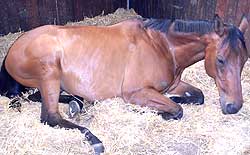
Colic - Types of Colic in horses, causes, symptoms & treatment
Colic is the general term for pain in the horse's abdomen. There are several types of equine colic with different causes.
 The severity of cases of colic can range from mild to potentially
fatal. It is a common cause of death in horses and ponies.
The severity of cases of colic can range from mild to potentially
fatal. It is a common cause of death in horses and ponies.
In the early stages of equine colic in a horse or pony it can be difficult to tell how serious the episode may be.
It is very important to treat any case of colic as potentially serious - Call your vet straight away if your horse is suffering from abdominal pain.
Types of Colic
- Impaction, blockage or stoppage
- This type of colic is caused by food blocking the alimentary canal.
It can sometimes occur following a worming dose as the expelled worm
bodies block the gut.
- Flatulent / Gas / Tympanic colic
- Flatulent colic is caused by gas being created faster than it can
be absorbed or passed out. It is natural for gas to be created during
digestion, but if it is trapped it can disetnd the gut wall and cause
abdominal pain.
- Spasmodic colic
- Spasmodic colic is caused by an irritated gut wall becoming overactive
and causing spasms. The vet can can use drugs to relax the horse and
reduce spasms.
- Artery blockage
- A thrombosis caused by worms, such as redworms
. Without its blood supply the section of gut involved dies unless
an alternative route develops in time
- Twisted Gut / Intestinal Catastrophe
- Probably the most serious form of equine colic - a twisted gut causes
intense abdominal pain. The intestines twist or become twisted around
the tissue that attaches them to the walls of the abdominal cavity.
This will cause violent colic symptoms. The blood flow in the intestine
becomes obstructed.
- Enteritis/colitis
- A serious form of equine colic due to inflammation of the small or
large intestines.
- Sand colic
- Suffered by horses that have been eating sand or grazing on sandy soils.
Symptoms of colic in horses and ponies
All or any of the following are symptoms of colic:
- The horse appears to be in pain, kicks at it belly and paws the ground.
- The horse is lying down and may stretch out and groan.
- Gets up and down and frequently rolls.
- Stamping of feet.
- Breaking out in a cold patch sweat.
- Breathing hurried and blowing.
- Bowel movements slow down or stop.
- Raised temperature.
- The horse may repeatedly look at his flank
- Standing in a stretched out posture as if trying to pass urine
Treatment of a horse with colic / how to care for a horse with colic
If out in the field the horse should be brought into the stable, and the vet called.
Do not feed a horse with colic, but a little water may be offered.
Keep the horse warm.
Don't attempt to administer any colic drugs to your horse without consulting your vet.
The horse or pony should be prevented from rolling.
Although you should not allow your horse to roll when he has colic - DO NOT walk him around for hours. Although useful in the early stages of of a mild colic this will only tire him, cause him pain and discomfort and make recovery harder,especially if he eventually requires surgery.
When the vet arrives he may use drugs to relieve pain, relax the horse and ease spasms. He may also administer a saline solution.
Immediate surgery is required in the case of a twisted gut.
Treating
Ringbone homeopathically | Haylage
for Horses
Angleberry - wart virus in horses
| Benefits and dangers of feeding
Garlic to horses
Devil's Claw | Hydrotherapy
for horses |
Cushings disease in Horses | Bran
mash
Livery Yards in West
Sussex | Horse feed
supplies - Norfolk | Horse
bedding advice
Symptoms and treatment of Choke
in horses | Horse
Bog Spavins | Equine
Dentistry | Hoof care tips
| Aubiose Bedding
For Horses